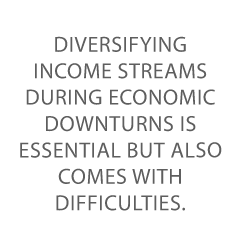Economic downturns remain one of the most dreaded phenomenons for businesses. In fact, according to a study by Harvard Business Review, 85% of growing companies toppled after a recession.
An unpredictable economic downturn can significantly affect the financial stability of businesses. To endure and prosper through these declines, businesses must adjust and weather the accompanying storm.
During these periods, having a diversified revenue stream is even more critical to guarantee the prolonged durability of a company.
This article will analyze the significance of broadening revenue sources during economic downturns and offer practical pointers and tactics for businesses seeking to do so.
Businesses will withstand and flourish during economic unpredictability by understanding the advantages of a diversified revenue stream and executing efficient strategies.
Understanding economic downturns
When an economy encounters a phase marked by dropping GDP, escalating unemployment ratios, and diminished consumer spending, the said economy is considered to be experiencing a downturn.
Individuals generally have less money to spend during economic downturns, and businesses struggle with earning profits. And this, in turn, can result in more layoffs, which will merely exacerbate the condition.
You can regard it as a domino effect. If one element of the economy, such as the property market, starts to shrink, it can have a chain reaction.
People grow more cautious of spending, reducing demand for goods and services and compelling businesses to earn less money, ultimately resulting in layoffs and reduced customer expenditure.
Jerry Han, CMO of PrizeRebel, adds
“Businesses must grasp the notion of economic downturns and the possible influence they can have on their finances, as this comprehension can enable them to adopt the requisite measures to alleviate the impacts and secure their long-term success.”
Significance of diversifying revenue streams
Amy De La Fuente, Director of Public Affairs of Bosco Legal Services, affirms
 “Diversifying revenue streams is more vital than ever in the current volatile economic situation. When you rely on only one source of income, you place all your resources in a single basket, exposing you to economic downturns and financial uncertainty. However, by having numerous sources of income, you spread your risk and build a safety net.”
“Diversifying revenue streams is more vital than ever in the current volatile economic situation. When you rely on only one source of income, you place all your resources in a single basket, exposing you to economic downturns and financial uncertainty. However, by having numerous sources of income, you spread your risk and build a safety net.”
Many companies and individuals encounter financial difficulties during economic downturns that lead to bankruptcy.
The latest bankruptcy figures and information reveal that having multiple income sources is necessary to decrease the likelihood of financial instability.
Hence, businesses must explore practical ways of diversifying their revenue streams instead of relying solely on a single source.
Several reasons demonstrate the importance of diversifying revenue streams during economic downturns:
- Risk Mitigation: An economic downturn can significantly impact your business’s income source. If you haven’t diversified your income sources, your business won’t have any fallback income sources, leaving it vulnerable to complete failure.
- Increased Resilience: Businesses that have diversified their income streams are better equipped to handle the impact of economic uncertainty and can continue operating even during challenging times.
- Enhanced Growth Possibilities: Businesses obtain access to a broader spectrum of opportunities through having various revenue streams. This empowers them to channel funds towards new goods, services, or sectors, invigorating growth and expanding their revenue streams.
Efficient strategies for diversifying revenue streams
How do you proceed now that you understand the importance of diversifying your revenue streams during an economic downturn?
Here are some of the most potent approaches for diversifying your revenue streams:
- Invest in a holding company: A holding company is a parent company with other enterprises, enabling it to diversify its income streams across numerous industries.
Investing in a holding company can offer a hedge against economic volatility. The parent company can generate income from several sources rather than depending on a single industry or enterprise.
As a result, it can help diminish your financial risk and provide a more stable source of income during economic downturns.
- Provide diverse products or services: If you own a business, offering complementary goods or services you can sell to your current customers might be an excellent idea. For context, you could begin selling coffee or tea if you operate a bakery.
- Enter fresh markets: You could expand your business into new geographical markets or industries. This will grant you access to fresh customers and help you tap into new revenue streams.
- Start a side hustle: If you have a skill or talent to commercialize, consider starting a side hustle. For instance, if you are a graphic designer, you could offer your services on freelance platforms.
- Lease a room in your home: If you possess a spare room, consider renting it on platforms like Airbnb. It can provide you with additional income without necessitating much effort.
- Sell your products online: If you own a product-based business, consider making your products available online, as it can give you access to a broader customer base and help you tap into new income streams.
Measuring the impact of adding diversified revenue streams
To evaluate the financial impact of broadening your income streams, utilize this return on investment calculator to gauge your potential return.
Diversifying your income streams will better equip you to withstand economic downturns and ensure financial stability in the long run.
Difficulties of diversifying revenue streams
We’ve acknowledged that diversifying income streams aids businesses in becoming more resilient during economic downturns, as it lessens their reliance on a sole source of revenue.
Nonetheless, diversifying revenue streams can also present its own collection of obstacles. These include:
- Cost: Diversifying revenue streams can be expensive as it may sometimes necessitate businesses to invest in new goods, services, or technologies.
But this can place a burden on their budget and may render it challenging for small businesses to compete with more giant corporations.
- Time: Not only can diversifying income streams be expensive, but they can also require time to set up, as businesses must scrutinize and evaluate new goods, services, or technologies. That can be a hurdle for businesses that must maintain smooth operations.
- Expertise: Businesses may need to engage professionals in new domains, such as advertising or technology, to diversify their income streams efficiently. And this can be an obstacle for small businesses with limited budgets.
- Market Acceptance: Not all new goods, services, or technologies may be accepted by the market, which can lead to an investment loss for businesses, making it difficult to discern whether their diversification endeavors will be successful.
- Risk: Diversifying income streams heightens a business’ risk, as it mandates them to invest in new areas that may not perform as well as their present sources of income.
Ultimately, this can make it challenging for businesses to balance their investments and maintain profitability.
Diversifying income streams during economic downturns is essential but also comes with difficulties. Businesses must evaluate the pros and cons to make the most effective decisions for their future.
Conclusion
Diversifying revenue streams during financial downturns is crucial for a company’s lasting stability, development, and endurance.
Possessing numerous revenue streams assists in decreasing reliance on a solitary source, thereby rendering the business more durable during challenging economic situations.
Despite the obstacles, including increased expenses, time consumption, market acceptance, and risk, diversifying revenue streams is worthwhile. It empowers companies to reach new customers, access new marketplaces, and enhance profitability.
By weighing the difficulties and advantages, companies can make knowledgeable judgments regarding broadening their revenue streams and positioning themselves for long-term success.
Contact us today for information on how wielding business credit effectively can help make it easier for your small business to diversify its revenue streams to weather any changes in the economy.
Catherine Schwartz, Finance Editor at Crediful:
Catherine is a personal finance writer covering a wide range of investment topics with the aim to help people achieve financial freedom. Passionate about financial literacy and considers it one of the most important life skills.


